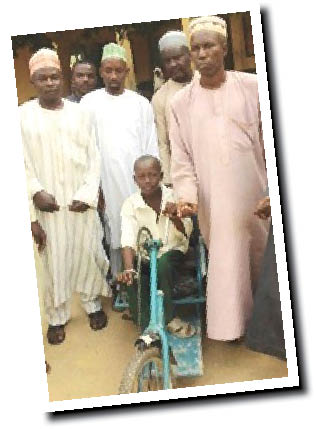Musa and his tricycle
“It was a dreadful day for me,” said Musa Mukhtar, recalling one of his worst day at school. “After the incident, I avoided going back to school. I was ashamed. If it was not for the head teacher, who came to talk to my parents and me at home and promised me a tricycle, I […]

“It was a dreadful day for me,” said Musa Mukhtar, recalling one of his worst day at school. “After the incident, I avoided going back to school. I was ashamed. If it was not for the head teacher, who came to talk to my parents and me at home and promised me a tricycle, I would never have returned to school.”
But it was no ordinary tricycle that Musa was promised.
Unlike his schoolmates, Musa, now in primary grade four at Faskari Model Primary School, is physically challenged and cannot walk. On that fateful day, when he was still only in primary grade one, Musa was not able to get help in time to be brought to the toilet.
“It was terrible. It caused an uproar and pupils were rushing out of the class to avoid the odour,” he recalled. For several days thereafter, Musa avoided going back to school. “I was ashamed of myself,” he said.
Faskari Model Primary School in Faskari, Katsina State was established in 1938, with an initial enrolment of 10 boys and 7 girls. The school is one of the 210 primary schools benefiting from the UNICEF Girls Education Project Phase Three, funded by the UK Department for International Development (DFID). The main objective of the project is to increase the number of girls enrolled in school and improve the quality of education. Prior to the commencement of Girls Education Project Phase One in 1995, the school had an enrolment of 839 pupils, of which 369 were girls – 44 percent. Now, the school has an enrolment of 2,506, of which 1,500 are girls – an increase to nearly 60 percent.
Although Musa had been going to school with the help of his family, schoolmates and teachers, they had to transport him on their backs – meaning that Musa sometimes arrived late or not at all, when he was unable to find someone to carry him.
But after that day, Musa avoided coming to school altogether. It was only the thought of having a tricycle so that he could get around independently that encouraged Musa to return.
Luck was on Musa’s side when a School Based Management Committee (SBMC) stepped in to help.
SBMCs were introduced by the Nigerian Federal Government, with the support of UNICEF and DFID, to encourage community engagement in school management. The local SBMC put Musa’s tricycle on its list of priorities for funding, and the community helped mobilize extra funds.
Finally, one eventful day, the tricycle was purchased and given to Musa by the SBMC. During the handover event, Musa’s father expressed his joy: “I have never allowed my children to finish primary education in the past. Once they reached primary grade three, I have always withdrawn them and sent them to Almajiri School,” he said. But he added, “I promise from this day forward that I will not withdraw my children – including my daughters – from school anymore, and the children I have already withdrawn will return to school and continue their education.” He also promised to allow Musa to complete his education and move on to the next level, until he achieves his dreams.
Challenges still exist. As Musa grows, the tricycle will no longer be big enough for him, and maintenance is often a problem. The SBMC and school management will need to continue to monitor Musa and his tricycle, and address any challenges that could affect Musa’s education.
However, for the moment, Musa is happy and attends school regularly with his tricycle. His teacher says that Musa now comes to school on time, and “is a talented child whose performance is always improving. He now ranks third academically in his class of 77 children.”
When asked about his ambition, Musa said he wants to become a medical doctor so that he can support poor and marginalised children in his community.
